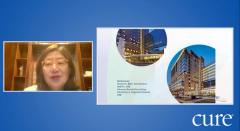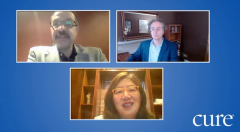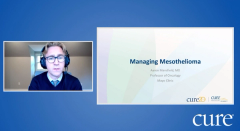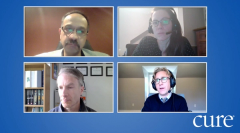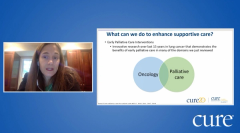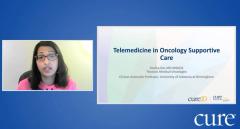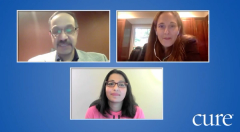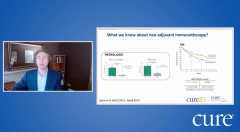
Educated Patient® Lung Cancer Summit Management of Early Disease Panel: October 1, 2022
Watch Dr. Hossein Borghaei, Dr. Jared Weiss and Dr. Anne Chiang answer questions about early disease management during the CURE Educated Patient Lung Cancer Summit.
Episodes in this series

The “Management of Early Disease Panel” was moderated by Dr. Hossein Borghaei, and included Dr. Jared Weiss and Dr. Anne Chiang.
Borghaei: if a patient already had their tumor tested, is there an instance when they should undergo biomarker testing again?
Chiang: That's a great question. And the answer is yes, absolutely. So if you're on a therapy, let's say in metastatic disease, and you have a great response, sometimes you can start to develop resistance in a few spots. And it is standard of care, it's important to test those areas to see, specifically, if there's a resistance mutation, because now we have therapies to target resistance mutations. So yes, we commonly do do that. We may test and do another biopsy at time of progression. And I've had many patients who we have done that with and we've actually talked, we've actually seen a different mutation. They can either go on a different therapy that's already approved or a clinical trial that's targeting that spot. And then I'll just say also, that there's a lot of research going on to also look to see if we can use liquid biopsies, or blood tests, as we are on therapy, to guide our treatment.
So what do I mean by that? Well, I suppose this goes back to the question on the slide that I really liked from Dr. Weiss, if we knew for sure that you had a lower chance of recovering, if you didn't have any micro-metastatic disease after surgery, we might treat you differently. And so there are trials now that look (at patients) after surgery. Let's do a blood test and see if you have a disease that's micro-metastatic within your blood or not. And whether you clear it in three weeks or six weeks, that might really help us to plan how long your treatment might need to be. Maybe you don't need to be on a drug for three years, or maybe you don't need to get adjuvant chemotherapy.
Borghaei: Yeah, I think that's really probably the next set of studies that we're going to be doing, looking at this minimal residual disease.
The next question that comes is something that I think we should emphasize, and that's with neoadjuvant (therapy). Is there biomarker testing done before neoadjuvant treatment? So what happens if someone has a mutation in EGFR or ALK? Do they still get neoadjuvant chemo-immunotherapy? So perhaps, Dr. Weiss, you can address that for us?
Weiss: So I think the answer is implied in the question. And it's very, very important, which is that in an era where we need to know EGFR, ALK, and I would argue perhaps some other biomarkers, to know the right thing to do. It's important to get testing. And (mutations are) important for two reasons. One is, at least in the case of EGFR, we have an adjuvant therapy, as you've just heard about, that should be considered. But both of these, EGFR and ALK, in addition to being strong, positive predictors, targeted therapy is going to work but are also powerful negative predictors against immunotherapy working. And so to do the right thing, to do things that work and avoid things that only have the potential for side effects, it's absolutely critical to test these upfront. And I think another nice thing about it is that, while we all pray for our patients that cancer never recurs, in the case that it does, this testing takes a few weeks. And so if you've done all the testing upfront, and you know the answer, then at the time when you need it, which of course we hope never happens, you're not waiting a few weeks to get it back. You're pre-armed to know the right thing to do. And so we can all argue about the right methods to testing, in what should be tested early, but the basic idea that at diagnosis molecular testing should go off, I think is simple and critical.
Borghaei: So here's the next question. So as someone who's had a 9-centimeter tumor eradicated with immunotherapy, do you think surgery should be part of the management all the time? So perhaps Dr. Chiang, we can start with your response and then we go to Dr. Weiss?
Chiang: So, 9 centimeters is pretty big. And you know, as Dr. Weiss had mentioned, this is where we have our multidisciplinary team get together at a tumor board and talk to the patients, because you want to be able to get our best results or with combined modality. So in this case, this is definitely a patient where we would consider neoadjuvant therapy. So trying to shrink that down a little bit. And, again, with the results of the CheckMate-816 trial, which Dr. Weiss presented, I think it's really impressive that you can have a pathologic complete response. So you basically completely treat your tumor so that at time of surgery, 25% of those patients who got chemo plus immunotherapy before surgery don't have any sign of active cancer. And that's fast. Do you need that? Do you need the surgery on top of that? Right now, I think whenever we can combine a local therapy like surgery or radiation with our systemic treatment, I think that's where we feel that we have the best effect. So right now, I would say yes, let's get that patient started on chemo plus immunotherapy going into surgery. And then following that patient.
Weiss: I completely agree. That is an appropriate patient to consider chemo/immunotherapy for. But I think the question was really: Okay, it seems like it's gone away on imaging, do I actually need surgery? And to me, I could rephrase the question as: How much do you trust radiology? How much do you trust, a CAT scan or even a PET/CT that shows a complete response? No evidence of cancer that's really true? And my answer is: I don't at all. When we get nice responses to chemotherapy, and I think the chemo/immunotherapy as well, what they're not “big ball” becoming “small ball” becoming nothing. (They’re_ more Swiss cheese-like. And so I think that until we get better modalities for imaging or other surveillance that can tell us if microscopic disease are present, you're playing with cure, you're playing with chance of cure, and thus decades of quality life by avoiding the OR. So one day, I'd love to do that for obvious quality-of-life reasons. But we need better surveillance technology before that or you risk taking a patient who's had this miraculous response, who's going to get cured, and flipping them to someone who's going to suffer and then die of lung cancer. So I actually have a very, very strong opinion that until we get better surveillance technology, it is absolutely imperative that a patient with a clinical complete response, meaning it appears on the CAT scan, that they still go to the operating room.
I can share you I've done a lot of neoadjuvant trials in head and neck cancer; the experience from others in lung cancer is very similar, that you can have an apparent clinical complete response where you think you've gotten it all. And then the pathology tells you that that's not true. And you can have the reverse. Actually, interestingly, (there is a case if you) haven't done that well, and then when it all comes out, (the cancer cells are “dead”)s. We had a handful of those on our last head and neck trial (that) we just finished evaluating the data; we had a handful of patients who would have been called stable disease, not even responders, that (the cancer cells were) actually all dead on the pathology. So the dimension just isn't good enough in the year 2022. To do that, I think we would all love to, once we have the appropriate technology.
Borghaei: Excellent. I agree with that.
Chiang: So, if there's any evidence of micro-metastatic disease, tumor cells in the blood, if they're all gone, maybe that would be the situation that we could actually avoid further surgery, but we're not there yet.
Borghaei: So we've talked a lot about surgery and going to surgery, but and at this point, what makes a tumor inoperable. For instance, the question that we have is there's a stage 1 cancer and what makes that inoperable? Is it the patient condition, or is it the location of the nodule, or the tumor or a combination of both?
Weiss: So this is where multidisciplinary tumor boards are really, really powerful for doing the right thing. Where it's really good to get all the medical oncologists focused on lung cancer, all the thoracic surgeons specialized in lung cancer, the radiologists, the radiation oncologists, all the allied disciplines in the same room to learn because this is complicated. As the question accurately implies, there are multiple axes for considering whether surgery is the optimal treatment. One of those is patient-specific: comorbidities and stress.
So there may be a patient who can stand up nicely to radiation but not surgery or vice versa. We have to personalize this, the medical situation of each patient. And then there are general stage-based rules about which are heavily opinionated and can be debated. I think, if you have a super fit patient, putting that axis aside right now and just talking about anatomy, by definition, a stage 1 cancer is resectable and a stage 2 cancer is resectable. … Stage 3 is where we get into the Wild West. And we really, really, really need to personalize things to each patient and to the state of data in the moment.
In particular, what is resectable in stage 3 is extraordinarily controversial. So in the era when PACIFIC came out, which was the data for adding immunotherapy after chemo radiotherapy in stage 3 disease, and before the data we just discussed came out ,something interesting happened, which is that the prognosis of unresectable stage 3 (lung cancer) was better than the prognosis of resectable stage 2 (lung cancer), just because of how extraordinarily powerful immunotherapy is. And so many of us shifted the pendulum of what we called resectable or unresectable to call almost all stage 3 unresectable to get patients that immunotherapy. Maybe that was right, maybe it was wrong, but it shifted that definition.
Now what's our newest data? I showed you (data from CheckMate -816) and there's actually another study called NADIM-2, (which) had the same chemo/immunotherapy regimen, but it was only stage 3 patients, both 3A and 3B. And I'll let my colleagues comment. But I will confess that I cringed at some of the patients, how advanced some of the patients included in that study were. And then when I saw the data on how they did, I recognize that maybe I was wrong, and maybe the pendulum needs to swing further back towards surgery. I think that's an open question in the general case. But what I'll say is that pretty much all stage 1 and 2 (lung cancers are) resectable. (Stage 3), I think there's a universal acceptance that that's resectable and, in my opinion, preferred now that we have immunotherapy with surgery. Then once you get to (multi-stage or stage 3A (there are multiple diseases involved in multiple locations), that's where you really get into controversy. I think it's my opinion and my colleagues’, at least one will surely disagree that the NADIM-2 data makes neoadjuvant (and then) surgery reasonable in that population where I wouldn't have favored it before. But then, once you reach a certain bulk (disease), I think most of us say that and that is different. But once you reach a certain bulk (disease), we start to think chemo/radiation followed by immunotherapy is a favored approach.
Borghaei: I would say that definitely patients’ comorbid conditions and everything else comes into play. And I think this is an area where every patient should be discussed in a multidisciplinary conferencem regardless of how small the stage is, where the tumor is, especially if it's thought that surgery cannot be helpful. I think there's something to be said for a very central tumor that might need a new anatomy and what's the likelihood of that pneumonectomy to be avoided, then I think these big complex surgeries should be more avoidable now in the era of chemo/immunotherapy. But there's another sort of question that I think dovetails to that cost.
Chiang: The only piece that I would add is that this is really important to shared decision-making with the patient. We have our multi-tumor, multidisciplinary tumor board but it's really important to talk to the patient. Some patients don't want surgery. Some patients really want surgery. Some patients can't live too far away and can't get radiation on a daily basis. Some people can't take that time off. You know, there's a lot of factors that go into it. And it's just really important to have that discussion with the patient and doctor together.
Borghaei: Do you guys test everybody now in the frontline stage, regardless of the stage of cancer? Do you do molecular testing on everybody? Even let's say stage 1 at this point, at your institutions? Dr. Chiang, whoever you can start?
Chiang: Yes, we do. We have done that for awhile, through consensus of our group and with pathologists, we've been testing the early stage and metastatic (stage), all our lung cancers, for a long time.
Weiss: Absolutely. While the numbers have improved very happily, as I showed in my first slide, patients do recur. And we have to acknowledge that in reality, we have to acknowledge how long molecular testing takes. And so in the case that recurrence doesn't happen, great. We can all celebrate. We've done some wasted sequencing, great. But in the case that recurrence does happen, it's really powerful to have that data back early and to know what to do.
Borghaei: So even if we're not using the information immediately for treatment decision, we think it is a good idea to have this available, just in case we need to access it quickly at a future time, that the insurance companies aren't listening to our conversation? That's a different, and that's a different meeting.
Chiang: You know, you may have a tumor at a different time, three years later, and this has happened multiple times where then we say, “Okay, we had testing of the original tumor, let's compare it to this one,” and was really important to know that this is a separate tumor, or completely different with the molecular profile, versus this is the same thing coming back.
Borghaei: I'm going to switch gears a little bit and go to stage 4, because we have a question. What's the ultimate duration of therapy? Let's say for this question, (Keytruda [pembrolizumab]) specifically, is there a limit to how long you can be treated if there is no disease progression for stage 4? Dr. Weiss, you start with this one, please.
Weiss: So the quick answer is nobody knows. We have very limited data to address this. There's a relative consensus in the thoracic world to treat up to two years and not longer than two (years) that I disagree with. And the reason is that the little bit of data that we have suggests that indefinite therapy may actually be better. On the other hand, there's an obvious, huge human drive to be cured, to know it and to get back to a normal life, not including the inconveniences and risks of ongoing therapy. So in my practice, I discuss it at one year, but encourage patients strongly to go to two years. At two years, I have a much more open conversation about potentially stopping (treatment). Right now, I get a PET scan before to help inform that conversation. I think in the future, we'll probably get circulating tumor DNA to help inform that conversation. I'm already doing that (with) an HPV-positive head neck cancer, where the assay is better validated. But my personal bias is if I had cancer, the answer is indefinite therapy.
Chiang: I usually have that discussion at two years. I agree with the fact that we don't know. And we certainly do know that there are patients who can even have two or three treatments and have side effects, and they can still have long-term effects of being free of cancer. So that's basically how I treat. I think there's also benefit to being not on therapy for patients who want to return to life, not going to the doctor's office, it commonly arises frequently.
Borghaei: I think this is definitely an area where we need to spend more time to figure out what the ultimate duration is. I don't think it's one-size-fits-all, there are definitely patients who might benefit from longer duration. There are definitely patients who, after six months or a year, might not need anything, and I think the lack of information here is really important. I'm just going to answer a couple of questions with the one-liners and then you guys let me know if you disagree. One is, are there biomarkers identified in small cell (lung cancer)? I know we didn't discuss it, but the question is important to address. I would say that there are no actionable biomarkers identified. But we do realize that small cell (lung cancer) is an odd, one disease. It's heterogeneous. There is a lot of work underway to try to define and figure out how to treat these different subtypes of small (cell lung cancer) so I see you guys nodding if there is a disagreement about that, add something just go ahead and add super exciting.
Chiang: For small cell (lung cancer) I think this is good, it has really opened up and there will be this idea that small cell is just a uniform disease, is treated the same (but that) is really changing. So we don't have specific therapies yet, but we're getting there.
Borghaei: So my assumption, I'm interpreting the question here, if the treatment is with neoadjuvant (therapy), the question says, would you just have a liquid biopsy to rely on? I'm not sure I completely understand. But I think if you've had neoadjuvant treatment, the follow-up is very much similar to what we've had like so like neoadjuvant therapy followed by surgery, followed by CAT scans periodically, based on recommendations from different guideline organizations. I'm not aware of any liquid biopsy monitoring at the stage, correct?
Weiss: I would comment though, that after neoadjuvant (therapy), patients were allowed in the study I presented to get additional adjuvant therapy, most did not. But I think it's an exciting area of research to try to investigate who would actually benefit with an improvement and curate from and some of that work is already ongoing.
Borghaei: And the last question to wrap up is, is it possible to go back to a specific therapy after progression on them? This could be targeted therapy or it could be immunotherapy. And I think this becomes a little more complicated. I think, at least in my view, if there is clear disease progression on a targeted therapy, then that requires a change in treatment. But immunotherapy, I think it all depends on the duration of how long it's been since the patient had been treated.
Transcription edited for clarity.
For more news on cancer updates, research and education, don’t forget to

